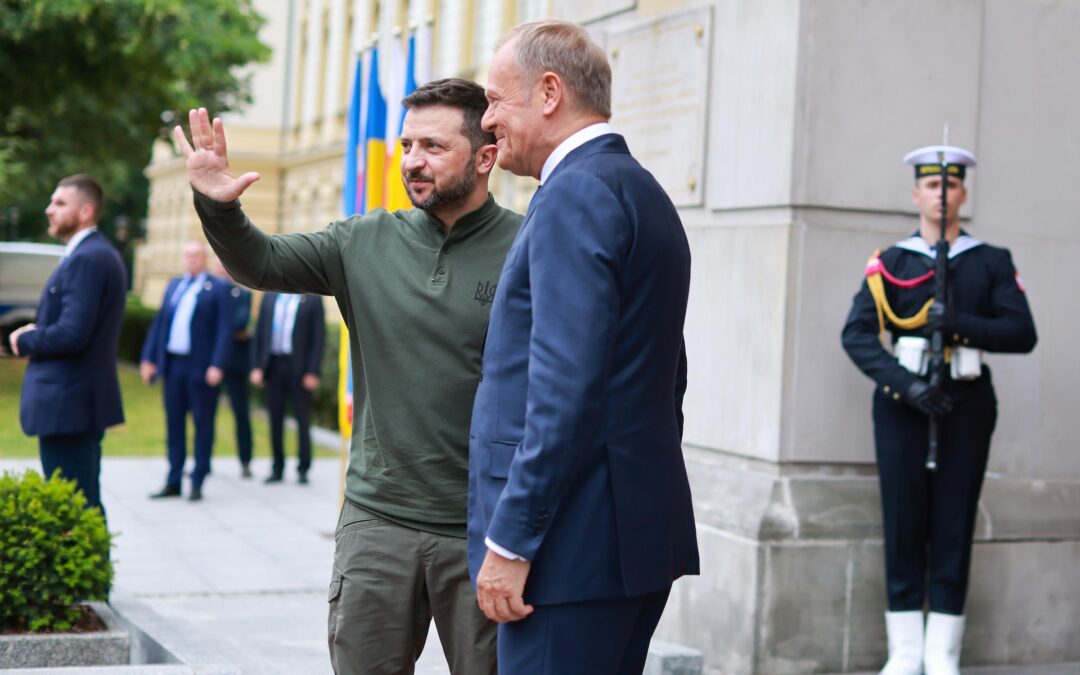Keep our news free from ads and paywalls by making a donation to support our work!

Notes from Poland is run by a small editorial team and is published by an independent, non-profit foundation that is funded through donations from our readers. We cannot do what we do without your support.
A deputy Polish prime minister, Krzysztof Gawkowski, has accused Volodymyr Zelensky of seeking to “drag Poland into war” with Russia. He also called on the Ukrainian president to stop “pestering” Poland for more support.
Last week, Zelensky spoke about Poland’s alleged failure to provide promised MiG-29 fighter jets to Ukraine and for not acceding to requests from Kyiv to shoot down Russian missiles over Ukrainian territory. His words were interpreted as criticism of Poland by some Ukrainian and Polish media.
Zelensky’s remarks immediately prompted a rebuke from Polish foreign minister Radosław Sikorski, and this week Gawkowski, when asked by broadcaster Radio Zet if Ukraine is acting fairly towards Poland, answered “no”.
Poland has proposed that Ukraine buy weapons from it on credit and pay the costs back after the war.
Foreign minister @sikorskiradek revealed the plan shortly after President @ZelenskyyUa appeared to criticise Poland for not providing enough support https://t.co/b7XzolaQxX
— Notes from Poland 🇵🇱 (@notesfrompoland) November 4, 2024
“I have the impression that the recent words that fall from the lips of President Zelensky are unworthy of a politician who owes Poland a lot,” said the deputy prime minister.
“The equipment that was transferred, the citizens that were taken care of – Poland is a great friend of Ukraine,” he continued. “As a politician but also as a member of the government, it seems to me that in such situations you say ‘thank you’ to someone, and not pester them.”
Gawkowski then specifically referred to part of the Ukrainian president’s remarks: “Zelensky wants Poland to shoot down missiles over Ukraine, which means he wants Poland to enter the war, which means he wants Poland to be at war with Russia.”
🎥 Wicepremier @KGawkowski o Ukrainie: Prezydent Zełenski chce wciągnąć Polskę do wojny z Rosją. Słowa niegodne, zapomnieli o pomocy. Oczekuję docenienia‼️@RadioZET_NEWS #GośćRadiaZET @BogRymanowski
Więcej ⬇️https://t.co/DLmWBFHayM pic.twitter.com/RigKucMNTV
— Gość Radia ZET (@Gosc_RadiaZET) November 4, 2024
“In these statements, Zelensky wants to drag Poland into the war with Russia. I do not agree with such statements,” he continued. However, Gawkowski also made clear that it is “our responsibility to fight to ensure that Ukraine survives, that it wins this war”.
The deputy prime minister’s remarks appear to contradict his own government’s position. A bilateral security agreement signed by Poland and Ukraine in July mentioned the aim of “intercepting in Ukraine’s airspace missiles and UAVs fired in the direction of Poland”.
However, Poland has said that it would only pursue such a policy with the agreement of its allies, and later in July NATO’s then secretary general, Jens Stoltenberg, rejected the idea, saying it would risk NATO “becoming part of the conflict”.
Gawkowski hails from The Left (Lewica), a junior partner in Poland’s ruling coalition, which is dominated by Prime Minister Donald Tusk’s centrist Civic Coalition (KO) and also includes the centre-right Third Way (Trzecia Droga).
In July, NATO’s secretary general rejected Poland’s proposal that it could shoot down Russian missiles that are in Ukrainian airspace but heading towards Polish territory.
He said it would risk NATO “becoming part of the conflict” https://t.co/3C3TexeLuJ
— Notes from Poland 🇵🇱 (@notesfrompoland) October 30, 2024

Notes from Poland is run by a small editorial team and published by an independent, non-profit foundation that is funded through donations from our readers. We cannot do what we do without your support.
Main image credit: KPRM (under CC BY-NC-ND 3.0 PL)

Daniel Tilles is editor-in-chief of Notes from Poland. He has written on Polish affairs for a wide range of publications, including Foreign Policy, POLITICO Europe, EUobserver and Dziennik Gazeta Prawna.



















